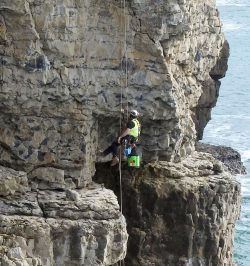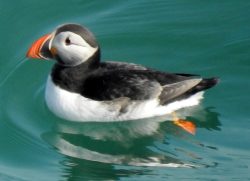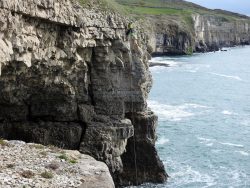 HIGH ropes experts have installed cameras on the cliffs near the National Trust’s Dancing Ledge in Purbeck to monitor the last known nesting site for puffins on the mainland of southern England. It is hoped that the cameras will reveal why these iconic birds are on the verge of extinction.
HIGH ropes experts have installed cameras on the cliffs near the National Trust’s Dancing Ledge in Purbeck to monitor the last known nesting site for puffins on the mainland of southern England. It is hoped that the cameras will reveal why these iconic birds are on the verge of extinction.
In the early 1900s, puffins were abundant in Purbeck and along the Dorset coastline, but they have declined severely over the last century or so. The colony in Purbeck is now tiny and isolated – the nearest puffin location is Alderney in the Channel Islands or the Isles of Scilly off the Cornish coast.
The installation of the cameras follows research completed last summer by marine ornithologist, Dr Richard Caldow, who noted that there were three nesting pairs of puffins on the site, but all failed to breed successfully. He said: “Every day, the puffins seemed to be taking plenty of fish to the nests which indicates that the food source wasn’t a problem. But after three weeks, they stopped their deliveries.
 “The pufflings (chicks) need to be fed for six weeks before they leave the nest, so there must have been a reason why the adults stopped taking them fish – such as the chicks having been predated by rats, gulls or crows.”
“The pufflings (chicks) need to be fed for six weeks before they leave the nest, so there must have been a reason why the adults stopped taking them fish – such as the chicks having been predated by rats, gulls or crows.”
The project is being supported by Dorset Wildlife Trust, which has provided expertise and advice and sourced cameras and other equipment. Two of the cameras are on a free loan from NatureSpy. The cameras to monitor the seabirds were lowered approximately 20 metres down a sheer cliff face and have been fixed into place with masonry screws. The precarious installation was carried out by trained rope access conservators from SSHConservation.
 Ben Cooke, the National; Trust area ranger in Purbeck, said: “These cameras will be key to helping us plan for the future of these special, rare seabirds. They’ll help collect really important evidence of what’s happening with the puffin colony, then we can assess if there is anything we can do to help. For example, if rats are the problem, we can look at ways to protect the nests from them. Along with our partner organisations, we’re committed to doing whatever we can to prevent the loss of this much-loved species.”
Ben Cooke, the National; Trust area ranger in Purbeck, said: “These cameras will be key to helping us plan for the future of these special, rare seabirds. They’ll help collect really important evidence of what’s happening with the puffin colony, then we can assess if there is anything we can do to help. For example, if rats are the problem, we can look at ways to protect the nests from them. Along with our partner organisations, we’re committed to doing whatever we can to prevent the loss of this much-loved species.”
Dancing Ledge is a popular spot on the south Purbeck coastline, used by walkers, climbers and other activity groups. Because of the inaccessible location of the puffin nests, the easiest way to spot them is from the sea – there are guided boat trips in the summer by Durlston Country Park and Birds of Poole Harbour.
Ben added: “While enjoying this spectacular landscape, we ask that people take their rubbish home with them, including left-over food. If rats are identified as the main problem for the puffins, then discarded food will exacerbate the issue.”
Photographs © the National Trust, by Peter Christie